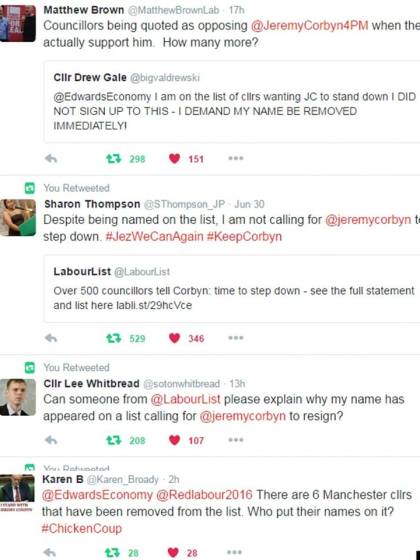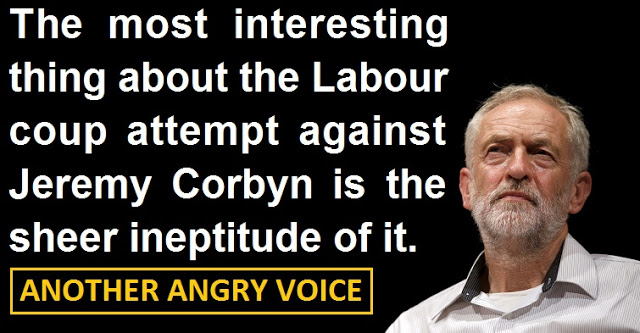The ineptitude of the failed Corbyn coup
from Another Angry Voice
2
July, 2016
The
most interesting thing about the failed anti-democratic
attempt to bully Jeremy Corbyn into resigning as Labour leader (just
10 months after he was elected with the biggest democratic mandate of
any UK party leader in history) is the sheer ineptitude of it.
If
there was anything that the Blairite
New Labour movement was
undeniably good at in its heyday, it was stage managing the news
agenda. They were masters at it. The glib soundbites, the cultivation
of links between the party top brass and the press pack, the
schmoozing with Rupert
Murdoch,
the pre-written editorials fed to the hacks to be lazily churnalised
into newspaper column inches, the showy and modernistic presentation.
In fact I’d say that stage management of the news agenda was the
single most significant hallmark of the Blair years.
Damn,
they were so persuasive that they even managed to convince about half
the country that
the invasion and occupation of Iraq was
going to be a great idea!*
The
remarkable thing about the pre-planned anti-democratic coup against
Jeremy Corbyn was the sheer ineptitude of it. Not only did the
Blairites carefully pre-planned operation leave their target still
standing after they threw everything they had at him in a 24 hour
“blitz”, their explanatory narratives made no sense whatever and
they left a trail of incriminating evidence all over the place.
PRE-PLANNING
The
coup was pre-planned. There is absolutely no doubt about that. The
people who were planning it were so confident of success that they
even briefed the Daily Telegraph about their plot to overthrow
Corbyn ten
days before the referendum result was even announced!
The
fact the coup was pre-planned blew a large hole in the narrative that
Corbyn had to be ousted because of his supposedly
weak EU referendum arguments ruining
the Remain campaign. In order for that narrative to make sense, the
plotters would have had to have known the result of the referendum in
advance, which they couldn’t have done.
The
Canary have done some sterling investigative work into
the shady network of dodgy PR companies stuffed full of Blairites,
shell companies, BBC collusion and so forth who are implicated in the
coup attempt. It was inept enough to leave such a trail of evidence
to follow up on, but the sheer hubris of telling the newspapers what
they were going to do ten days before they did it looks like the kind
of PR cock-up that Blair, Mandelson, Campbell and the like worked
strenuously to avoid during their time at the top.
Apparently
the methods are pretty much the same as classic Blairism, but the
execution has become sloppy, over-confident and bizarrely
incompetent.
A BIG MISJUDGEMENT
Whatever
the reason they decided to gamble on Corbyn caving in and resigning,
it backfired terribly when he refused to go and defiantly challenged
them to put up a candidate in a democratic election.
Perhaps
the people who orchestrated this anti-democratic coup attempt
believed their own propaganda a little too much? They’d spent the
last 10 months, ever since Corbyn was elected as leader, briefing the
press that he’s a such weak leader, so maybe they thought he’d
just meekly capitulate to their stage managed coup attempt?
Whatever
the reason for this over-confident assumption that Jeremy Corbyn
would simply roll over and resign (betraying the 250,000 Labour
members who voted for him just ten months previously as a
consequence), they got it badly wrong and put themselves in a
terrible bin.
They’ve
been scrabbling around looking for for their ideal “Anyone But
Corbyn” candidate to stand in an election that Corbyn is almost
certain to win, especially given the way he’s attracted so many new
people to the party that it’s literally doubled in membership since
he became the star of the Labour leadership election last summer.
An
additional problem for them is the fact that 60,000 people have
joined the Labour Party in the week since the attempted coup plot was
launched. Anyone imagining that the majority of them are people
enthused about voting for the as-yet-unnamed ABC candidate must be as
delusional as the bunch of Labour MPs who actually seem to consider a
low-profile, strategically inept, gaffe prone, insincere, iraq war
approving political water carrier like Angela Eagle to
be more electable than Jeremy Corbyn.
By
putting themselves in a position where Jeremy Corbyn can take them on
in re-election which he will almost certainly win with an even bigger
mandate, they’ve clearly endangered themselves dramatically. Corbyn
had demonstrated that he was willing to work with them and allow them
to survive within the party, but by trying to stab him in the back
and missing, they’ve now given him the chance to run
a leadership election based on giving constituencies the right to
deselect corrupt/right-wing/venal/self-serving/party damaging MPs and
replacing them with people who might do a better job of actually
representing their constituents interests rather than their own.
Just
like David
Cameron’s EU referendum gamble,
the Blairite coup gamble has backfired spectacularly too.
THE BIGGER PICTURE
The
Labour MPs who were planning this post-Brexit coup obviously got so
giddy with excitement, and so locked into the mindset of putting
their narrow party political plot into action, that they completely
lost sight of the bigger picture.
The
aftermath of the biggest Tory cock-up in decades and the resignation
of the Prime Minister was the least opportune moment to kick off an
internal party political spat imaginable.
Just
look at it from their strategic perspective for a moment. They claim
to care about the Labour Party (so much so that they shed crocodile
tears on the telly over it) and they claim that Corbyn doesn’t do
enough to hold the Tories to account.
If
they had any strategic nous, and if these clims were true, instead of
attempting their coup immediately after Brexit, the plotters (Hillary
Benn, Angela Eagle and the like) could have made a huge show of
attacking the Tories for Brexit, they could have used their friends
in the media to give their criticisms prominence, whilst Corbyn’s
get ignored, belittled and disparaged.
Instead
of helping the Tories out of the Brexit hole they’d dug for
themselves and booting the Labour Party down there in their place as
they did by launching their coup immediately, the plotters could have
won plaudits for their own strong responses in the crisis situation,
boosting the Labour Party rather than trashing it, and ensuring their
own stars were rising in the process.
Thus,
a few weeks, or months after Brexit, when the public narrative was
clearly set that Brexit was the fault of the Tories, they could have
tried their rebellion, pointing to the fact that they laid all the
big hits on the Tories in the wake of Brexit, not Corbyn.
They
didn’t play it that way because they lost sight of the bigger
picture: That some things in life are actually more important than
who is the leader of the Labour Party, and the vote for Brexit was
undeniably one of those things.
INSINCERITY, UNJUSTIFIABLE CLAIMS AND DELUSIONAL RUBBISH

The hubris of briefing the Telegraph about what they were planning to do before they did it was bad enough, but some of the dire stuff the plotters came out with after the coup attempt was launched was staggeringly bad. Angela Eagle’s resignation letter was catastrophically insincere. Just two weeks after praising Corbyn’s determined hard work and blasting the mainstream press for the lack of Labour coverage during the campaign, she bitterly criticised him for conducting the campaign with “half-hearted ambivalence”!
Another
example of an utterly appalling resignation letter is that of the
Darlington MP Jenny Chapman who joined in the carefully choreographed
sequence of resignations desgned to inflict as much damage as
possible on Jeremy Corbyn and the Labour Party. In her letter
quitting the shadow education brief she claimed to be speaking on
behalf of her constituents in saying that they had lost confidence in
Jeremy Corbyn.When
she posted this letter on her Facebook page she
was inundated with furious comments along the lines of “how dare
you presume to speak on my behalf”. The overwhelming majority of
replies expressed confidence in Corbyn and an extreme lack of
confidence in her.
Tristram
Hunt probably wins the prize for the worst resignation letter of all
though. In it he actually claimed that “Labour urgently needs to
play the role of effective opposition” because the current crisis
is as bad as Suez in his opinion. Apparently launching a failed coup
attempt against your own party leader and completely letting the
Tories off the hook for their culpability is his definition of
“effective opposition”. He then went on to slam Corbyn for making
a supposedly poor case for Remain. In Tristram Hunt’s constituency
of Stoke on Trent 69.4% voted for Leave (in Jeremy Corbyn’s
Islington constituency 75.2% voted for Remain). Talk about trying to
shift the blame! Apparently
Hunt’s own Constituency Labour Party have already had a vote of
confidence supporting Jeremy Corbyn followed by a vote of no
confidence in Tristram Hunt.
FORGED SIGNATURES

Making bizarre claims to be speaking on behalf of your constituents when resigning is one thing, but listing 500 local councillors who you claim have signed a letter supporting the coup against Corbyn when the list contains the names of numerous councillors who back Corbyn’s leadership and are utterly furious that their name has been added to the letter without their consent.
Claiming
that somebody has signed a letter when they haven’t is tantamount
to forging their signatures. LabourList should be absolutely ashamed
of themselves for such deceitful behaviour, but they’re not.
They’re far too concerned with their anti-democratic efforts to
force Corbyn’s resignation than they are with maintaining anything
resembling decent standards of truth and honesty.
CONCLUSION
Blairism
has undeniably lost its shine. Tony Blair was once the golden boy who
won landslide after landslide, but he isn’t anymore. He’s widely
reviled, and his sequence of attacks on Jeremy Corbyn during the
leadership election in 2015 probably did more to raise Corbyn’s
profile than any other factor. Blairism lost two General Elections in
a row (2010 and 2015) and in electing Corbyn with such a huge mandate
the Labour members were crying out for a change of direction,.
But
Blairites think they know best, so they’ve been sabotaging Jeremy
Corbyn at every turn culminating in their the launch of their inept
coup attempt after just ten months.
The
problem that this failed coup attempt exposes is that the Blairites
aren’t even good at the stuff they used to be. In the age of social
media, their attempts to manage the news agenda have failed
spectacularly. They may have the entire press pack on their side
supporting their grubby self-serving coup, but social media is alive
with criticism of the mainstream narrative, and the more they try to
force their version of events down people’s throats, the more
people are seeing their crude manipulative propaganda for what it is.
Perhaps
the most telling thing of all is that the failure of their own coup
attempt means they can be hoisted by their own petard. If Jeremy
Corbyn is as weak and incompetent as they’ve always claimed, how
incompetent must they be to have failed so spectacularly to overthrow
him, despite planning it for weeks and then throwing everything they
had at it?
Insider:
'Corbyn will not quit until Chilcot verdict so he can brand Blair war
criminal'
JEREMY
Corbyn may be clinging on to power because he wants to brand Tony
Blair a “war criminal” after the release of the Chilcot Inquiry
report next week, Labour insiders have claimed.
2
July, 2016
Corbyn
has been one of the most vocal opponents of the Iraq War, which cost
179 British lives and killed tens of thousands of Iraqis, and has
suggested that Blair cooked up a deal with former US President George
Bush before the decision to invade Iraq was officially made.
The
Chilcot Inquiry report, which contains 2.6 million words, is to be
released on Wednesday. The inquiry was set up by former Labour prime
minister Gordon Brown in June 2009 to look into the run-up to the
2003 invasion of Iraq.
It
is expected to “damage the reputations” of a number of
high-ranking officials including Blair. Mr Corbyn said last year that
he believed the Iraq War was an illegal one and that Mr Blair “has
to explain that”.
He
said: “We went into a war that was catastrophic, that was illegal,
that cost us a lot of money, that lost a lot of lives.
“The
consequences are still played out with migrant deaths in the
Mediterranean, refugees all over the region.”
Calls
for Corbyn to quit have fallen on deaf ears, and insiders believe
part of the reason may be because he is waiting for his chance to
publicly condemn Blair.
A
source said: “It is believed that he won’t quit until after
Chilcot.
He
is holding on until after then. It will give him his chance to say
something big about Blair and the Iraq War. I wouldn’t be surprised
if he called him a war criminal. The Corbyn camp could also gain from
Chilcot.
There
is bound to be a backlash towards Blair and that type of politics. It
might give Corbyn the strength to hang on.” An attempt to impeach
Blair in the wake of the Chilcot report is thought to be on the
cards.
A
group of cross-party MPs believe the former Labour leader could be
impeached over allegations he breached his constitutional duties as
Premier. The power has not been used since 1806 when Lord Melville, a
Tory minister, was charged with misappropriating official funds by
the Commons. He was acquitted.
To
do so, one MP would need to present a dossier of evidence called an
Article of Impeachment, that is collated by a committee of MPs. If
approved by MPs it is then presented to Black Rod, a senior officer
in the House of Lords, before a trial.
If
convicted, Mr Blair could in theory face a prison term. The report,
which is named after its chairman Sir John Chilcot, is also expected
to criticise British Army commanders over equipment deficiencies when
the troops were sent in.
In
particular, the Ministry of Defence is likely to be criticised for
the long delay in replacing the Snatch Land Rover, which was dubbed
the “coffin”, as IEDs, or bombs, could rip it apart.
Families
of those killed in Snatch Land Rovers are furious commanders deployed
the vehicle, which was designed for riots in Northern Ireland and was
never supposed to have been sent into a war zone.
Author
Tim Ripley who has documented the failures of the war in a new book,
Operation Telic: The British Campaign In Iraq 2003-2009, said the
report will make difficult reading for senior commanders.
He
said: “The operation was not properly resourced, they were not
equipped for the level of war fighting they faced. They had very poor
intelligence and at the time lacked drones, electronic warfare skills
and instead relied on human intelligence.
“At
the outset of the campaign many soldiers did not have items, like
desert boots, others lacked body armour, it was poorly planned and
poorly executed. Ministers and senior commanders relied on the ‘can
do’ attitude of the Army to make it work.”
During
the Chilcot Inquiry, held from 2009 to 2011, Lord Drayson, who headed
procurement during the war, said he chased officers for a replacement
for the Snatch but could not understand why they had not approved it.
His
said he wanted it replaced in 2006 but it was still being used in
2008 when three SAS soldiers and a female intelligence officer died.


No comments:
Post a Comment
Note: only a member of this blog may post a comment.